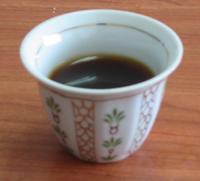An interviewer has asked me to explain, "what Americans should understand about the situation Palestine." I have been surprised by how difficult it is to answer this question.
Last week, I was standing on a roof-top in Marda when another international peace activist yelled, "That was live! They're shooting live bullets over there!" Immediately, everyone crouched down, keeping our bodies below the level the ledge around the roof-top.
Everyone, that is, except a Palestinian father who, ducking only
 slightly, carried out a dozen tiny ceramic cups on a sliver tray.
slightly, carried out a dozen tiny ceramic cups on a sliver tray.Perhaps this is what Americans should understand about Palestine: even when soldiers are shooting M16 bullets, Palestinians serve Arabic coffee to all of their guests.
Perhaps we should not talk about politics. Ask any Palestinian and they will tell you that politics have not served them well. Summits, negotiations, road-maps – these have meant so little to daily lives of Palestinians. And the little they have meant has been so bitterly disappointing. The Oslo process carved up the West Bank into areas A, B, and C, institutionalizing Israeli control. Barak's "generous offer" would give Palestinians a state, broken in to three different sections, in only 20% of British Mandate Palestine, and without control over Jerusalem. The new Gaza disengagement, if carried out, will not mean the end of settlements in the West Bank. In the city of Hebron, Christian Peacemaker Teams reports that as the disengagement date draws closer, settlers are attacking Palestinians more brutally and in more organized ways. For these families, the disengagement means more violence. It's worse than "another failed political initiative."
So if politics means so little to the people of Palestine, then let's not speak of it at all. Instead, I'll tell you how Palestinian hospitality knows no bounds. I'll tell you about the beautiful children I play with every day. I'll tell you about the sheep and the donkeys. I'll tell you all of the good things about a group of people I've fallen in love with.
Last night I went to a wedding. Nasfat, a Palestinian organizer in Marda, told us "Marda is special; soldiers in the day, parties at night!" Huddled with the women and girls, I watched the men dancing around in a huge circle. The girls wrote in my hands in henna and the women chatted and gossiped. But then soldiers began to walk down the hillside, approaching the village. In the middle of a wedding, villagers had to decide how to respond. They had to restrain their little boys, keeping them from confronting the soldiers in the pitch black night. This is the meaning of military occupation: even at a wedding, the army wasn't far away.
There is no way to escape the occupation and its politics in Palestine. Palestinian hospitality is carried out under fire. The beautiful children I play with are terrified of the soldiers they see every day. In Hebron, these beautiful children have been strip searched and sexually harassed at a checkpoint on their way to school. In the village of Tuwani, where I bought the Palestinian dress I wore to the wedding last night, the sheep have been poisoned by settlers. In Marda, donkeys choke on tear gas. The daily life of the people I love is constantly interrupted, constantly made frightening and oppressive, all by the occupation. All by politics.
Avoiding politics is impossible here, though people at home in the US often ask me to. Don't be biased, they say. Support both sides. How can we? When one side is perpetuating such suffering on another, how can we fail to pick sides?
The simple truth is that we must pick a side: the side of justice. But picking the side of justice isn't simple. Picking justice's side doesn't mean cheering for Israel or Palestine, as though this conflict were a football game. It may be difficult, but I believe that we can choose to support both sides. Not politically – for what good is politics any way? – but on a human level. By pursuing a real, meaningful justice through love, we can help to support a solution that will be good for both Israel and Palestine. I say without apology that this solution must involve an end to the occupation and an end to the suffering of the Palestinian people. But this is because through ending the occupation, Israel will find true security. Through an end to injustice, we can all find peace.
It's time to develop a politics of nonviolence. We must stop ignoring all of the examples of nonviolence in our own history and start to take courageous, unapologetic, and loving stands for justice. This is what Palestine needs. It is what Israel needs. And it is certainly what we in the United States needs. Please, for the sake of a people I love so much, do something. In a spirit of love, do something for justice.



No comments:
Post a Comment